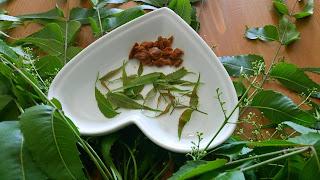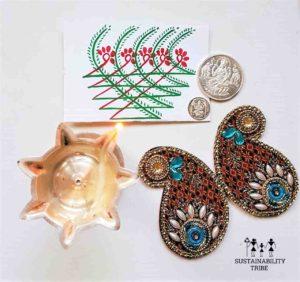
Gudhi
Traditionally in Maharashtrian homes, we erect this beautiful Gudhi in balcony or terrace, a high place symbolizing the Brahma flag ( I would love to call it Earth Flag) and victory flag of Lord Rama. Bright green or yellow cloth adorned with brocade (zari) tied to the tip of a long bamboo over which gaathi (sugar crystals), neem leaves and a twig of mango leaves and a garland of red flowers are tied. A silver or copper pot is placed in the inverted position over it. Altogether, it is called as Gudhi. We adorn our doors with mango and neem tree leaves.
The neem tree symbolizes ‘health’, as the medicinal properties of neem are well known in India since ancient times. We also have a ritual of this festival to consume bitter neem leaves or juice along with coriander seeds and jaggery to make a healthy start of a year. Neem is believed to purify the blood and develop the immune system against diseases according to ancient Indian Ayurveda. Here I would like to relate this festival to World Health Day, which is also always closer to Gudhi Padva.


Saraswati Poojan
Being so far from the home, I make it a point to celebrate festivals like Gudhi Padva as much traditional way possible, so that my son can learn our traditional values as well as environmental significance involved in our traditional festivals and celebrations!


